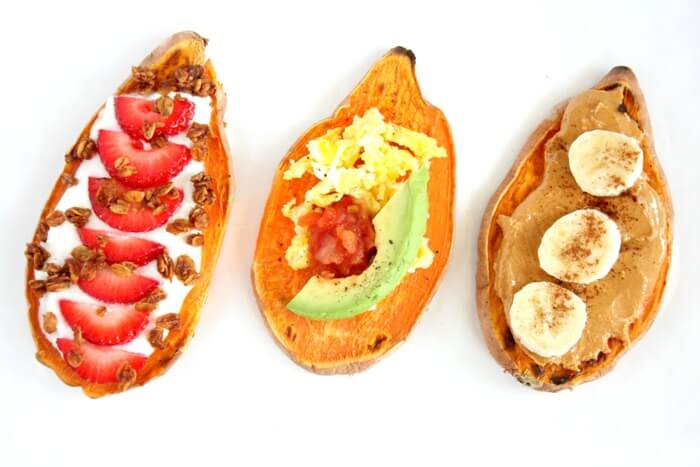Foods To Support Muscle Recovery

While workouts and staying hydrated can work to promote muscle recovery and repair, so can eating the right food. When eating to support muscle recovery, prioritize foods that are rich in protein and carbohydrates.
Foods to enjoy
Cottage Cheese
Cottage cheese is an excellent source of both whey protein and casein protein. Whey protein helps replenish muscles quickly post-workout. Casein protein is more slow-acting which allows your muscles to continue recovering even as you sleep. Cottage cheese is a great snack to have before or after a workout. Enjoy it on wholegrain toast or with fresh fruit.

Sweet Potato
Exercise can deplete your body’s glycogen stores, so it’s important to eat carbs afterwards to rebuild them. Sweet potatoes are perfect for this as they are high in complex carbohydrates and also give you a range of other important nutrients, including vitamin A and potassium. Sweet potatoes are good roasted, baked, mashed, or even sliced to make toast.

Watermelon
Watermelon is one of the most refreshing fruits and can help your muscles when they are feeling overly sore. Watermelon is made up mostly of water so it’s perfect for hydration. Watermelon also contains vitamin C, vitamin A, potassium and magnesium. Watermelon can help to reduce muscle inflammation, because of its vitamin C content.

Salmon
Salmon is a very healthy choice with its high omega-3 fatty acids, protein, vitamin B, potassium and selenium counts. Studies have shown that omega-3 fatty acids can reduce inflammation in the body. In addition, the potassium found in salmon can help to replace electrolytes that were lost during your workout. It also has protein which is required to help repair and rebuild muscles after working out.

Eggs
Eggs are rich in protein, which is good to support muscle recovery. Consuming protein after working out gives your body the amino acids it needs to repair and rebuild muscle tissue. Breakfast, lunch, dinner, or as a snack, eggs are versatile, easy to cook and relatively inexpensive.

Spinach
Spinach is a great superfood. It contains vitamin A, vitamin C, vitamin K1, iron, calcium, potassium and magnesium. When you workout and sweat a lot, your body becomes dehydrated. When this occurs, the level of electrolytes in your body decreases. Spinach, rich in potassium and magnesium which are key electrolytes, is a great food to eat to help your body recover. Spinach can be added to breakfast dishes, as well as many lunch and dinner meals. Salads, pastas, bakes, casseroles and risottos all can have spinach added in, making it easy to enjoy.

Bananas
Bananas are a fantastic source of carbohydrate, potassium, vitamin B6, vitamin C, magnesium and fiber. Bananas are a great choice for those who work out because they provide a quick source of energy, as well as some essential vitamins and minerals. Also some research has shown that eating bananas can help to reduce exercise-related muscle cramps and soreness, due to their high potassium content. Before or after a workout, they’re a great option all day long.

Turmeric
With its anti-inflammatory properties, turmeric is a go-to food for recovering muscles. There are so many ways to cook with turmeric. Turmeric can be sprinkled on roast vegetables or added to curries, soups, rice, juices and smoothie bowls.

Nuts and Seeds
Loads of nut and seed varieties are great sources of omega-3 fatty acids, which work to fight inflammation and improve bone and joint health. They are also a good source of protein which is essential for muscle recovery. Walnuts, chia seeds, flax seeds, pecans and hazelnuts are all good choices. Snack on them while you’re on the go, add a handful to your smoothie or sprinkle them onto an acai bowl to get your dose in.

Green Tea
Green tea is packed with catechins (a natural antioxidant) that can help prevent and reduce muscle cell damage caused by exercise. Green tea is also known for its ability to boost your metabolic rate. The higher your metabolic rate is, the more calories you’ll burn during your workout.

Foods to avoid
While some foods are optimal for supporting muscle recovery, there are others that won’t provide as many of the key nutrients you need to repair post-workout. Where possible, minimize your intake of the following items to help your muscles and body recover.
Salty Processed Foods
If you’re feeling low on energy and dehydrated after a workout, you might crave something salty. This is totally normal, as you lose water and nutrients like potassium, when you sweat. While salty fries or crisps might be tempting, a better option would be a banana smoothie. The banana replenishes your potassium and carbohydrate levels, while the milk, chia seeds or nuts provide the protein you need to help repair those sore muscles.
Energy or Protein Bars
When you’re running low on time, packaged bars can be an easy food to grab and go. However, many types of energy and protein bars are full of artificial sweeteners that may wreak havoc on your digestive system. They’re also generally low in fiber and the essential vitamins and minerals you need to repair post-workout.
Beverages
Instead of reaching for a soda or sports drink, choose plain water or pure coconut water. Those options will hydrate you without the added sugar and chemical sweeteners. Be mindful to keep hydrated in the days following your workout also will ensure you recover well and stay energized.
Food can power you up to workout and can work to mend your muscles, too. With so many tasty and nutritious options to aid muscle recovery out there, it’s easy to include some in your diet when you’re facing muscle soreness. Keep working on choosing those healthy items to help you to continue to work towards your fitness goals.

